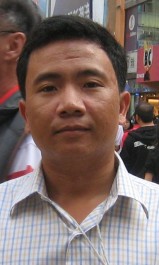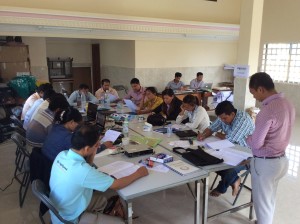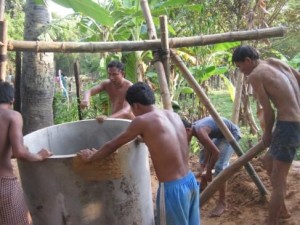 Some 17 years ago Peuvthida Pok (Thida, for short) coordinated a DNA Vision Conference in Phnom Penh, Cambodia. Today, Thida is still carrying the message.
Some 17 years ago Peuvthida Pok (Thida, for short) coordinated a DNA Vision Conference in Phnom Penh, Cambodia. Today, Thida is still carrying the message.
Thida directs the Wholistic Development Organization (WDO) an entity birthed some years after the original vision conference. He spoke with us recently by Skype.
I believe you met Bob Moffit about 17 years ago at a Vision Conference. What has happened since then?
Yes, Bob and Darrow came to Cambodia in 1999 and we have used their materials ever since. We have trained over 2,000 pastors in Cambodia, and now hundreds of churches are demonstrating Jesus’ love to their communities.
What can you tell us about your group, Wholistic Development Organization?
After the vision conference, the participants from various NGOs formed a committee to promote wholistic ministry. I was a member of that committee. It ended in 2005, when some of the missionaries (with Food for the Hungry and other organizations) and other foreigners left Cambodia.
At that time, we decided to merge these committees into my organization, Wholistic Development Organization.
How would you describe the Church in Cambodia and the challenges it faces?
In the years before 1999, the Church was focusing only on spiritual things and was not growing. After 1999 we started wholistic ministry practices. The Church started new social ministries, schools, ministry to the poor. Now the Church is growing.
However, we also have some challenges in the rural areas because many church members have migrated to cities, and even different countries (especially Thailand, Malaysia, and South Korea) to find jobs. The churches in some rural areas have been largely reduced to children and older people.
 What training opportunities have you offered since 1999?
What training opportunities have you offered since 1999?
Today we are working in five provinces. In each province, one staff member offers one training every month to the church leaders and pastors. In this way we are training 30 pastors in each province every year. We train all the interested pastors in each province. Besides the teaching, our staff members go to the churches to coach and help the leaders follow up what they learned in the congregation, how to start a seed project, for example.
We also have pastors’ conferences that bring pastors together and give them opportunity to share what they have learned from wholistic ministry. About 30% of the pastors become trainers themselves.
Some pastors have started small businesses such as vegetable farms, or raising chickens. Some also teach agricultural techniques to the people in their areas.
What DNA teachings were most powerful for you?
The seed project. When the pastor does a seed project they can communicate well with the communities and local authorities, the relationship between Christian and non-Christian becomes close, persecution is reduced.
One seed project is road repairing in the communities. They have to invite the local authorities, non-Christians, to participate in repairing the road. Christians and non-Christians start building relationships. Non-Christians are less inclined to persecute because they understand the love of Christians toward them. Local authorities come to admire the Christians, relationships are good.
Can you share one story of transformation?
Rum Long is one of the villages in the Siem Reap province. In the dry season, this village faces the problem of not having enough water for humans and animals.
Pastor Tep Kunhan is planting a church in this village. He prayed for many years for a solution to this water shortage, but he didn’t know how to start a project. His relationship with the people of the community was not good because he had preached about love, but wasn’t showing it.
Pastor Kunhan was invited earlier this year to attend the Wholistic Ministry training held by WDO. After the training, he identified the lack of water in the dry season as one of the community’s problems. In addressing this problem, Pastor Kunhun decided he would run a project of digging a well for the church and community.
 He and his family began to dig the well. The community people were also invited to participate in this project, as the well is not only for the needs of pastor Kunhan but is for the needs of many other people in the village.
He and his family began to dig the well. The community people were also invited to participate in this project, as the well is not only for the needs of pastor Kunhan but is for the needs of many other people in the village.
Others joined, and relationships and friendships were built. The experience of digging the well together not only brought water but also opened people’s hearts to the gospel.
Pastor Kunhan is now very happy, as there are many people who have opened their heart to the gospel. “All these good things are the results of the Seed Project and God had done great things in our church by adding more people to our church,” he says.



